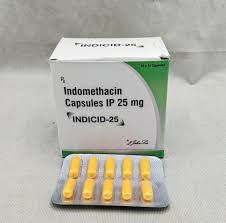Indocid is a brand name for indomethacin, a non-steroidal anti-inflammatory drug (NSAID) used to relieve pain, reduce inflammation, and lower fever. The 25mg capsule formulation is commonly prescribed for various conditions, including arthritis and acute pain.
Key Features
- Active Ingredient: Indomethacin 25 mg per capsule.
- Dosage Form: Oral immediate-release capsules.
- Pack Size: Typically available in packs of 10 capsules per strip (10x10).
Indications
Indocid is indicated for:
- Rheumatoid Arthritis: Helps alleviate symptoms associated with this chronic inflammatory disorder.
- Osteoarthritis: Provides relief from pain and inflammation due to wear and tear of the joints.
- Gouty Arthritis: Effective in treating acute gout attacks characterized by severe joint pain.
- Ankylosing Spondylitis: Used to manage symptoms of this inflammatory arthritis affecting the spine.
- Bursitis and Tendinitis: Reduces pain and inflammation in conditions affecting the shoulder and other joints.
Mechanism of Action
Indomethacin works by:
- Inhibiting Cyclooxygenase (COX): It reduces the production of prostaglandins, which are chemicals responsible for inflammation, pain, and fever.
Dosage and Administration
- Recommended Dosage for Adults:
- The typical starting dose is 25 mg, taken 2 to 3 times daily. The dosage may be adjusted based on individual response and tolerance, with a maximum daily dose of up to 200 mg.
- Administration Instructions:
- Take the capsules with a full glass of water, preferably with food to minimize gastrointestinal irritation.
Side Effects
Common side effects may include:
- Nausea or vomiting
- Abdominal pain or discomfort
- Dizziness or headache
- Diarrhea or constipation
Serious side effects can include:
- Gastrointestinal bleeding (e.g., bloody or tarry stools)
- Severe allergic reactions (e.g., rash, difficulty breathing)
- Liver damage symptoms (e.g., jaundice)
Precautions
- Contraindications: Not suitable for individuals with known hypersensitivity to indomethacin or other NSAIDs, active gastrointestinal bleeding, severe liver or kidney disease, or those who have recently undergone coronary artery bypass surgery.
- Pregnancy and Breastfeeding: Consult a healthcare provider before use during pregnancy or breastfeeding.
- Drug Interactions: Inform your healthcare provider about all medications being taken to avoid potential interactions.

